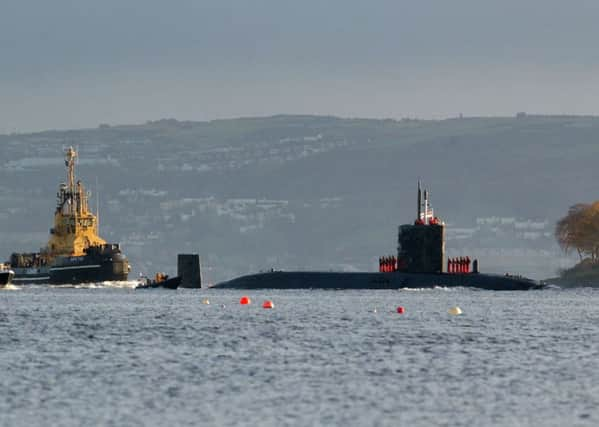Leaders: Labour’s Trident stance sailing into danger


The tremors that have turned Scottish politics on its head over the past year continue to produce some fearsome aftershocks – the latest being yesterday’s vote in the Scottish Parliament over Trident.
There was a time not so long ago when the idea that all but one of Labour’s MSPs would join the SNP in calling for the scrapping of the controversial weapons system would have been inconceivable. Yet so it came to pass at Holyrood yesterday evening, with Jackie Baillie the lone figure to vote against a call to reject Trident’s renewal.
Advertisement
Hide AdAdvertisement
Hide AdHaving been appointed by Kezia Dugdale to the party’s shadow cabinet in August, Ms Baillie is an influential figure, but the numbers do not lie. She is going against her party’s grain, with even Ms Dugdale, a multilateralist, among 32 of the party’s MSPs to find in favour of a Scottish Government motion, amended by Scottish Labour, urging the UK government to cancel plans for renewal and commit to a defence diversification strategy to protect defence workers’ jobs.
Just 48 hours after the party voted to oppose renewing Trident at its conference, senior Scottish Labour figures said yesterday’s Holyrood result gives the clearest indication yet of the party’s stance over one of the most contentious issues in Scottish politics. Opposition, said Claire Baker, the party’s democracy spokeswoman, represented its “clear position”.
After much to-ing and fro-ing, that may well be the case, but the proceedings at Holyrood are far from an end to the debate, both nationally and within Labour itself.
A case in point is the warning yesterday from the UK party’s former leader, Lord Kinnock, who stressed that the British electorate will not back unilateral nuclear disarmament, describing it as a “reality” that “has to be dealt with”.
Some will no doubt question the intervention from someone who belongs to Labour’s past, but the party’s current generation should not rush to dismiss the 73-year-old’s assessment of the situation. He is a wise head with plenty of experience in the politics and perception of Labour policies, and what impact they can have at the ballot box.
More presciently, his reading of the public’s mood on Trident is backed up by various polls. One carried out earlier this year by Survation on behalf of the SNP found 47.2 per cent people said it should not be renewed, with 31.6 per cent of the view that the Faslane facility had a future.
That may point to a clear split, but it is hardly the kind of gulf in opinion on which elections can be won and lost.
At a Scottish and UK level, Labour remains on a voyage of self-discovery, finding out what the party of 2015 stands for and how it can best represent the wishes of the electorate. It is a journey the party must undertake in order to restore its credibility, but the danger is that it devotes its time and resources to formulating an ideology that does not strike a chord with ordinary voters.
Advertisement
Hide AdAdvertisement
Hide AdAny blunt assessment of the party’s capabilities as an electoral force since the general election would surely make uncomfortable reading for Ms Dugdale and her UK counterpart, Jeremy Corbyn. The party has succeeded to a point in moving away from Ed Miliband, but has this change resulted in an organisation fit to govern? The answer, surely, is as conclusive as the Holyrood vote.
How was this young life lost?
The death of a premature baby at Scotland’s newest superhospital campus, after the infant became infected with a harmful bacteria, is a tragedy and our first thoughts should be with the family. Losing a child, especially one so young, is an unimaginable torment no parent should have to endure.
For the staff at the maternity unit at Glasgow’s Royal Hospital for Children, who devote their careers to nurturing young lives, it is also a difficult time. Five other babies in the unit have the bacteria present although, mercifully, medics say they are not giving any cause for concern.
NHS Greater Glasgow and Clyde’s public health protection unit and infection control team have rightly adopted a vigilant approach and have launched an investigation into the increased incidences of the bacteria.
The health board said a “small increase” in Serratia marcescens colonisation cases was identified in July as part of routine surveillance, with the situation being “monitored closely” over the past four months.
The baby that died had existing complex medical problems. At this stage, we do not know how the child, or any of the other infants, became infected. The board has stressed that not all the cases involve the same strain of the organism and investigations to establish any links are ongoing.
This is the correct approach. The loved ones of the premature baby are going through a period of great pain and the parents of other infants with the bacteria will be anxious, regardless of the reassurances of trusted professionals. In time, however, they will seek to understand how this tragedy took place. Hospital officials are confident that the existing infection control procedures are robust and, hopefully, its investigation can shed light on a sad loss.